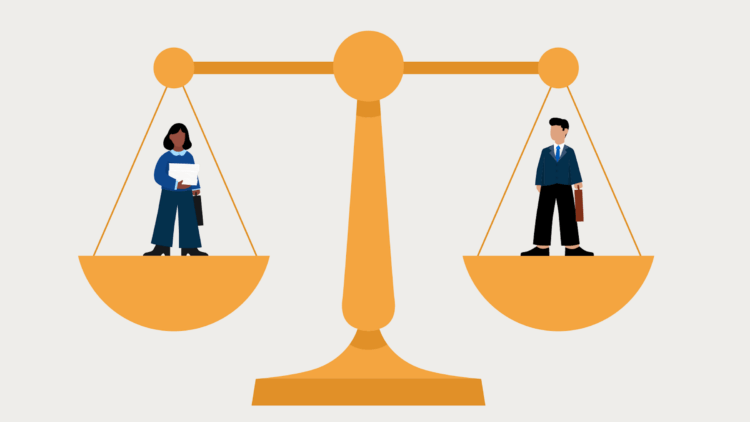Have you ever wondered why some legal professionals call themselves lawyers, while others go by attorney? It’s a question that comes up more often than you might think—you’ll even find entire Reddit threads discussing whether attorneys and lawyers are the same!
In the legal world, terminology matters. While “lawyer” and “attorney” might seem interchangeable, there are subtle distinctions worth highlighting. This blog will explore what separates an attorney from a lawyer, how the terms vary around the world, and share a few insights if you’re considering a career as an attorney.
Curious about other legal terms? Visit our legal dictionary for a full glossary.
Is a lawyer the same thing as an attorney?
In theory, there’s a difference. An “attorney” is short for “attorney at law”—a title that indicates the person has graduated from law school and is licensed to represent clients in court.
A “lawyer,” on the other hand, is someone who has attended law school and can offer legal advice but may not represent clients in court. To put it simply: All attorneys are lawyers, but not all lawyers are attorneys.
The history of these words helps make this distinction clear. Attorney is the older term. The Oxford English Dictionary (OED) tracks the word attorney as being derived into English from atorné or aturné in Anglo-Norman. The first recorded English use is attributed to the year 1330 CE. The Oxford English Dictionary (OED) lists the first recorded instance of the word attorney being associated with a person formally appointed to represent a person in a court of law, or a trained member of the legal profession who has been admitted to practice in the courts of common law.
“Attourneis in cuntre, þeih geten siluer for noht.”¹
The OED lists the earliest use of lawyer being recorded in 1377, with the meaning embracing every branch of the profession in a wider definition than appearing in court.
“Ȝe legistres and lawyeres Holdeth this for treuthe.”²
Why do some lawyers call themselves attorneys?
You’ve probably heard lawyers referring to themselves as attorneys. In the US, these terms often get swapped around in everyday conversation. The difference between a lawyer and an attorney is subtle, and outside of formal contexts, it’s usually not that significant. It’s similar to the use of “solicitors” and “barristers” in some other countries.
Even the American Bar Association doesn’t make a strong distinction. On their website, the ABA states: A lawyer (also called attorney, counsel, or counselor) is a licensed professional who advises and represents others in legal matters.
That said, some places do have stricter distinctions when it comes to legal roles and titles. If you’re uncertain, it’s always a good idea to check with your local bar association or review professional requirements. And if you’re planning to practice in multiple jurisdictions, be sure to check out our resource on bar reciprocity by state to see what’s required.

You may like these posts
The difference between a lawyer and an attorney outside the United States
We’ve covered the US perspective, but what about other countries? That’s where things get a bit more nuanced. While “attorney” is often used in the US to refer to someone who practices the law, this title doesn’t always apply elsewhere.
Here’s a quick look at legal titles around the globe:
- Canada: “Attorney” isn’t commonly used. Legal professionals are typically called “lawyers,” unless they hold a specific title, such as “Attorney General.”
- United Kingdom: The term “attorney” isn’t widely used in the UK. Instead, legal practitioners are classified as either “barristers” or “solicitors,” depending on their training and specific duties. Barristers represent clients in court, while solicitors provide legal advice, manage case preparation, and so on.
- Australia: Similar to the UK, legal professionals are generally known as either “barristers” or “solicitors,” not attorneys.
To sum up, while “attorney” is a common term in the US, it’s not typically used in other English-speaking countries.
How do you become an attorney?
In the US, the educational path to becoming a lawyer or an attorney is essentially the same. It takes around seven years to complete the necessary training and education. Here’s what the typical journey looks like for someone aiming to become an attorney:
- Earn an undergraduate degree: Before applying to law school, you’ll need a bachelor’s degree. While law schools don’t require a specific major, choosing a field that sharpens your reading, writing, and analytical skills is recommended. Political science, history, and English are popular pre-law majors.
- Graduate from law school: After finishing your undergrad, the next step is law school. The application process can be competitive, requiring the Law School Admission Test (LSAT). This standardized test assesses critical thinking, reading comprehension, and logical reasoning—key skills for any lawyer. Law school usually takes three years to complete.
- Pass the bar exam: After law school, passing the bar exam is the next step to becoming licensed to practice law. Bar exams are administered by state, so be sure to study for the requirements in your jurisdiction.
- Become licensed and start practicing law: Once you pass the bar exam and meet any additional state-specific requirements, you’ll be officially licensed to practice law. From there, you can start your legal career. That could mean joining a law firm, working for a government agency, or even starting your own practice.
It’s a challenging path to become an attorney. But for those passionate about the law, the rewards are well worth it. For more details, check out our How to Become a Lawyer hub.
The bottom line: Are attorneys and lawyers the same?
In the US, “attorney” and “lawyer” are often used interchangeably. However, the distinction comes down to whether or not they represent clients in court. Keep in mind that the meaning can vary based on where you practice and who you’re speaking to. When in doubt, you can always consult your local bar association for guidance on proper terminology.
While “attorney vs. lawyer” terminology can vary based on where you practice, your legal practice management software doesn’t have to. Clio is approved by all 50 state bars and makes it easy to run your practice—no matter where you are. Book a demo today.
Footnotes
¹ The simonie: a parallel text edition • (ed. Dan Embree and Elizabeth Urquhart) · Middle English Texts edition, 1991 (1 vol.). (Middle English Texts 24).
² William Langland • The vision of William concerning Piers Plowman. • A. text 1362; B. text 1377; C. text 1393; (together with) Richard the redeles 1399 (ed. Skeat; E.E.T.S. 1867–85; 1886).
Frequently Asked Questions
Is a lawyer the same thing as an attorney?
The terms “lawyer” and “attorney” are often used interchangeably in the US. Technically, though, an attorney is someone licensed to represent clients in court. A lawyer can provide legal advice but may not represent clients in court.
Is an attorney more powerful than a lawyer?
Not necessarily. While attorneys specifically represent clients in court, both lawyers and attorneys have the same level of legal education and training. The distinction is more about their role, rather than their power or authority.
What is the difference between an attorney vs. lawyer salary?
Salaries for attorneys and lawyers are generally similar. However, it can vary depending on factors like experience, location, and the size of the firm. Some practice areas tend to offer higher earnings than others.
We published this blog post in November 2024. Last updated: .
Categorized in: Business








